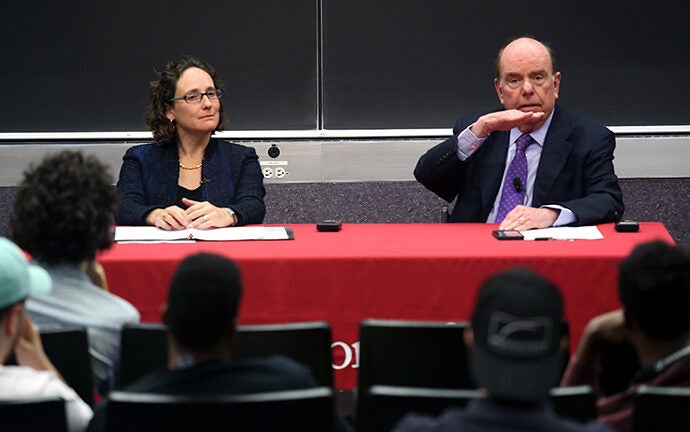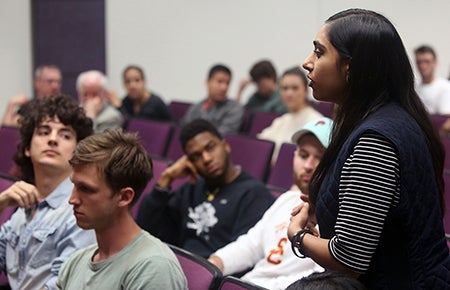
Dornsife Dialogues event explores political civility
As the nation witnesses a serious erosion of respect in political discussion, students, faculty and staff gathered to hear USC Dornsife Dean Amber D. Miller and Robert Shrum, Carmen H. and Louis Warschaw Chair in Practical Politics and director of the Jesse M. Unruh Institute of Politics, address the question: “How has public discourse on critical topics come to be so combative and is a return to civility possible?”
The event, held at Mark Taper Hall on Feb. 24, launched the Dornsife Dialogues series, Miller’s initiative that provides a forum to explore complex ideas and promote civil discourse within the USC Dornsife community.
Led by faculty from a range of fields within the letters, arts and sciences, the series of talks will examine issues of the moment with scholarly depth.
Bringing civility back
Miller and Shrum traced the history of the decline in courtesy in political discourse and explored how the university can lead a change toward more civil exchanges, before opening up the floor to questions.
The dialogue series was inspired by the frequent observation that people in our nation today seem to have forgotten how to talk to each other in a civil way, Miller noted in her opening statement.
“We’ve forgotten how to disagree with each other without turning each other into monsters, and have a reasoned debate,” she said.

Aarohi Mahableshwarlear, a freshman majoring in international relations at USC Dornsife, asks a question during the event. Photo by Mike Glier.
Shrum agreed. “We live in a time, whether we like it or not, of polarization, retaliation, loss of civility on an unprecedented scale, and a vast coarsening of the public dialogue,” he said.
Miller argued that universities should be taking the lead in returning civility to debate.
“[The university] is the place where we think about things from different perspectives, where we make sense of ideas in different ways, and where we rip each other’s arguments to shreds with civility and finesse,” she said. “So, what better place than here to take a big step back, and to look at the issues that are happening today from a different perspective: the perspective of a research university?”
A history of dissent
Peter Mancall, Andrew W. Mellon Professor of the Humanities, Linda and Harlan Martens Director of the Early Modern Studies Institute and divisional dean for humanities and social sciences, moderated the event. He reminded the audience that political dissent is part of the fabric of the nation’s history, as shown by bitterly opposed Founding Fathers Thomas Jefferson and John Adams. Despite their adversity, however, Jefferson and Adams maintained a lifelong correspondence.
“Here are these people deeply divided but who understood the underlying value of speaking with each other,” said Mancall. “Not of cutting each other off.”
To illustrate the courteous and respectful nature of more recent political discourse, Shrum showed a clip of the first televised presidential debate in 1960 between Vice President Richard Nixon and Senator John F. Kennedy.
“No matter what you thought of your opponent, you had to talk in a certain way,” Shrum said of the era’s debates. “It had to be fact-based; it had to be respectful.”
Although the intense passions aroused by the Vietnam War created a country of deep divisions, anger and instability, after Watergate the country reverted to a level of civility that held into the 1980s.
“All through this period, you could have really big disagreements …, but you also have a civility that enabled cooperation,” Shrum said. “So you had this sense of people who fight all day until 5 or 6 o’clock, and then sit down and get along with each other.”
The real rupture, Shrum argued, was the election of President Bill Clinton — seen as illegitimate by many opponents who had assumed that a Vietnam War protestor could never be president.
Angry personal attacks on George W. Bush from 2001-08 laid the seeds for what we’re living through now, Shrum said. He went on to emphasize the key role of the internet and social media in enabling a flood of brutal personal assaults on President Barack Obama.
Set the example
Miller and Shrum agreed that the first step for the university is to model civil dialogue.
“Begin with the assumption that different ideas come from different world views, or different starting points, not from a place of malice,” Miller said. “Listen carefully, to each other’s arguments, analyze the different components of the arguments, separate the facts from assertions, and be honest about what the facts are. Remember, everyone’s entitled to your perspective, but you’re not entitled to make up facts. And then, debate these ideas in a civilized way.”
Martin Luther King Jr., who practiced civil discourse, even in the midst of the most incendiary provocations, was a good role model, Shrum said.
“When you believe something is wrong, stand your ground,” Shrum said. “Argue with it. Do it with firmness and civility, even in the face of rampant incivility.
“The university can and should model what civil discourse can be like, and in the process, if the academy and the public square can interact more together, then I think it can begin to help reshape the public square, and to set new standards,” he added. “I don’t think it’s going to happen overnight; I don’t think it’s easy. I think we’re going to go through some rough years, and some hard passages, but I think we can get there.”
View full video of event at dornsife.usc.edu/dialogues_civility